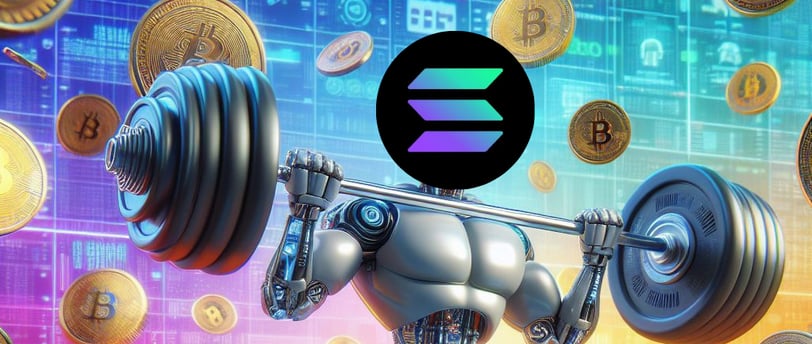Solana: High-Speed Cryptocurrency
Explore the groundbreaking features of Solana, a blockchain platform revolutionizing the crypto space with its incredible speed and scalability. Learn about Solana's Proof of History consensus, its potential in decentralized applications and finance, and how it compares with competitors like Ethereum. Understand the challenges and opportunities ahead for this innovative blockchain, and how it's shaping the future of decentralized technology.


Introduction
Solana is a blockchain platform that has gained significant attention in the cryptocurrency space due to its exceptional speed and scalability. In this article, we will delve into the unique features of Solana, including its Proof of History (PoH) consensus mechanism, and explore its potential in decentralized applications and finance. We will also compare Solana with its competitors, such as Ethereum, and discuss the challenges and opportunities that lie ahead for this innovative blockchain platform.
Understanding Solana's Speed and Scalability
One of the key advantages of Solana is its remarkable speed and scalability. Unlike many other blockchain platforms, Solana has achieved high transaction throughput without compromising on decentralization. This is made possible by its innovative PoH consensus mechanism.
The Proof of History mechanism in Solana provides a historical record of all transactions, enabling nodes to verify the order and time of events without relying on heavy computational work. This allows for fast transaction processing, reducing the time it takes for transactions to be confirmed. As a result, Solana can handle thousands of transactions per second, making it one of the fastest blockchain platforms in existence.
In addition to its speed, Solana also offers low transaction fees. The platform's efficient design and high throughput enable it to process transactions at a fraction of the cost compared to other blockchain networks. This makes Solana an attractive option for developers and users who require fast and affordable transactions.
Solana's Ecosystem and Comparison with Competitors
Solana has built a robust ecosystem that supports a wide range of decentralized applications (dApps) and projects. The platform's speed and scalability make it an ideal choice for developers looking to build high-performance applications on the blockchain.
When comparing Solana with its competitors, such as Ethereum, it becomes evident that Solana has a distinct advantage in terms of transaction speed and cost. Ethereum, while being a pioneer in the blockchain space, has faced challenges with scalability, leading to high fees and slower transaction times during periods of high network activity. Solana's architecture, on the other hand, allows it to handle a significantly higher transaction volume, making it a more efficient and scalable platform.
Furthermore, Solana's compatibility with the Ethereum Virtual Machine (EVM) allows developers to easily port their existing Ethereum-based projects to Solana, taking advantage of its speed and scalability without the need for significant modifications. This interoperability makes Solana an attractive option for developers seeking to migrate their applications to a more efficient blockchain platform.
Solana in Decentralized Applications and Finance
Solana's speed and scalability open up numerous possibilities for decentralized applications and finance. The platform's ability to handle high transaction volumes in real-time makes it suitable for applications that require instant confirmation, such as decentralized exchanges (DEXs) and high-frequency trading platforms.
Moreover, Solana's low transaction fees make it an attractive option for users engaging in microtransactions and low-value transfers. This has the potential to facilitate the growth of various applications, including micropayments, gaming, and content monetization.
Additionally, Solana's high-speed blockchain can support complex smart contracts and decentralized finance (DeFi) applications. The platform's scalability ensures that DeFi protocols can handle a large number of users and transactions without experiencing bottlenecks or exorbitant fees. Solana's ecosystem already hosts a growing number of DeFi projects, further solidifying its position as a promising platform in the world of decentralized finance.
Challenges and Opportunities
While Solana offers impressive speed and scalability, it is not without its challenges. As with any emerging technology, there are areas that require further development and refinement. Solana's success will depend on its ability to address these challenges effectively.
One of the main challenges for Solana is maintaining decentralization as the network grows. As the platform attracts more users and developers, it will be crucial to ensure that the network remains decentralized and resistant to censorship or control by a few powerful entities.
Another challenge is fostering widespread adoption and awareness of Solana. Despite its technological advancements, Solana is still relatively new compared to more established blockchain platforms like Ethereum. Building partnerships, attracting developers, and educating the wider community will be essential for Solana's growth and success.
However, these challenges also present opportunities for Solana. By addressing the scalability and decentralization concerns, Solana can position itself as a leading blockchain platform for a wide range of applications. Its speed, low fees, and compatibility with existing Ethereum projects give Solana a competitive edge in the rapidly evolving world of blockchain technology.
Conclusion
Solana's exceptional speed and scalability make it a formidable player in the blockchain space. Its unique Proof of History consensus mechanism, coupled with low transaction fees, sets it apart from its competitors. Solana's ecosystem supports a variety of decentralized applications and finance, while its interoperability with Ethereum allows for easy migration of existing projects.
Although Solana faces challenges in maintaining decentralization and achieving widespread adoption, the opportunities it presents in the world of blockchain technology are significant. As the platform continues to evolve and address these challenges, it has the potential to revolutionize industries and drive innovation in decentralized applications and finance.
